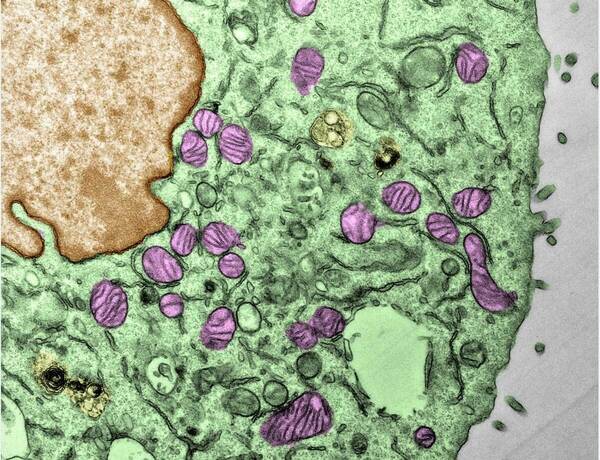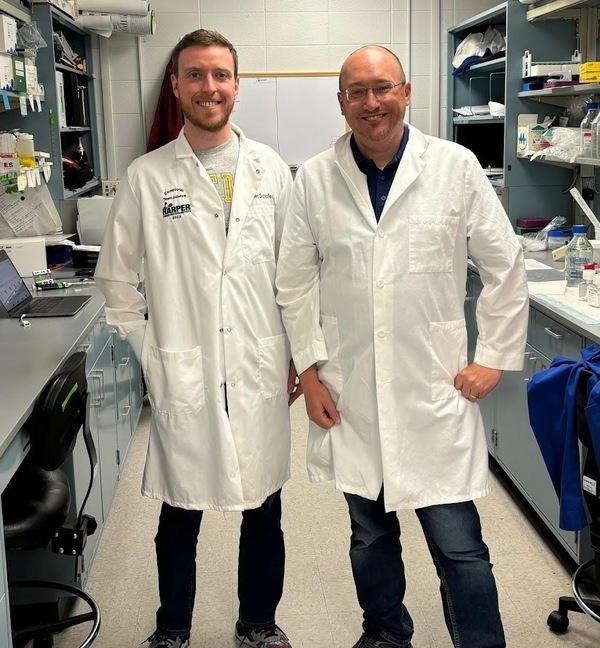
An enzyme in cancer cells called aconitate decarboxylase (Acod1) appears to cause the release of short chains of amino acids, called peptides, that interfere with the way our bodies’ immune cells fight the disease, a new study by University of Notre Dame cancer biologist Zachary Schafer shows.
According to a research article in Cell Reports, cancer cells with high levels of Acod1, located in the mitochondria — the “powerhouses” of cells — were discovered to decrease the effectiveness of a certain type of cancer therapy called immune checkpoint inhibitor therapy. These drugs block protein “checkpoints” made by our immune system’s T cells and some cancer cells, preventing the T cells from killing the cancer. This type of cancer immunotherapy has proven to be effective in some cancers like melanomas, but not for cancers including prostate cancer, according to Schafer, the Coleman Foundation Associate Professor of Cancer Biology in the Department of Biological Sciences.
Previous research on Acod1, including another recent study in the lab of Xin Lu, the John M. and Mary Jo Boler Collegiate Associate Professor in the Department of Biological Sciences, has been focused on how Acod1 impacts the behavior and function of immune cells themselves.
“Our research shows that the cancer cells can use this enzyme as well. Surprisingly, Acod1 activity in cancer cells dampens the immune response, which is a really novel and exciting discovery,” said Schafer, who is affiliated with the Harper Cancer Research Institute.

As part of the experiments described in Schafer’s paper, researchers reduced the levels of Acod1 inside of prostate cancer cells. Next, the researchers introduced those altered cells into mouse models. Once the levels of Acod1 in the cancer cells were reduced, the immune checkpoint inhibitor therapy worked: The T cells rushed in to do their job, diminishing the cancer.
This project grew out of research in Schafer’s lab from 2018, when his group discovered a novel cancer cell death pathway involving changes in the mitochondria. Following that paper, his lab discovered that the cancer cells that were defective in this cell death pathway were also resistant to immune checkpoint inhibitors. He and collaborators then determined that, as a result of the significant changes in the mitochondria, Acod1 was responsible for the resistance to immune checkpoint inhibitors.
“That the cancer cells are better able to evade the immune response is totally dependent on this Acod1 enzyme,” Schafer said. “It’s definitely antagonizing the effect of the T-cells.”
Schafer and members of his lab are continuing to explore the effects of Acod1 for future studies. For instance, Schafer is interested in how Acod1 causes the production of the peptides, and he does not yet know the precise configuration of the amino acids in the peptides released by cancer cells with Acod1.
“We do not yet know how the T cells interact with these peptides, which is the other thing is that we are trying to figure out,” Schafer said.
This study was led by recent Notre Dame Ph.D. graduate James H. Schofield. In addition to Schafer and Schofield, other authors on the study are Emma Albano, Mark A. Hawk, Sean Murphy, Loan Duong, Sharif Rahmy,and Xin Lu, all from the University of Notre Dame, as well as Abigail E. Ellis, Joseph Longo, Russell G. Jones and Ryan D. Shelton of the Van Andel Institute, Grand Rapids, Michigan.
The paper was funded by the National Cancer Institute, the National Institute of Allergy and Infectious Diseases, the Coleman Foundation, and the Malanga Family Excellence Fund for Cancer Research, and the College of Science and Department of Biological Sciences at Notre Dame.